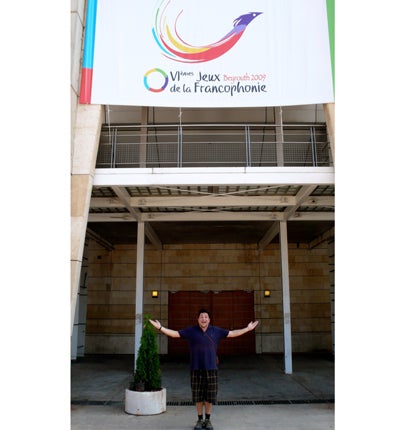Dom Joly: Olympic spirit is alive and...French?
Weird World of Sport

Sadly, I arrived in Lebanon just too late to attend the "2009 Jeux de la Francophonie"– the sporting highlight of the French-Speaking World, and this year taking place in Beirut. The posters and signs were still all over the Lebanese capital. I have to admit to being a little ignorant of this French-speaking Olympics and so, aware that you would be keen to know more as well, I've done some research – don't thank me, it's my pleasure.
There were 46 French-speaking countries taking part in the games. Countries like France, Senegal, Ivory Coast, Romania, Greece ... er ... Macedonia. Hang on, these last three aren't exactly well-known French-speaking countries. They're not even close. Sure, if there was a protest, then I'm confident that you could find some people in each country who could speak passable French but still ... not a good start.
Maybe I'm just being picky. Let's have a look at some of the events that you could compete in should you have done O-level French and hail from Vladivostok. There's athletics, boxing, basketball, football, judo and beach volleyball ... so far, so not Gallic. It's the "cultural" side of the games that caught my attention. As well as competing for gold medals in the sporting events, should you be a puny French-speaking nerd from Sweden with no particular sporting prowess ... fear not. Up for grabs were also medals in song, fairy tales, dance and sculpture. What I wouldn't have given to have been at the tense "Song" finals. A hairy Edith Piaf sound-alike from Cameroon took part in a sing-off with a man doing a passable impression of "Ca plane pour moi" by Plastic Bertrand. This man was representing "The French Community Of Belgium" as the Flemish had refused to take part.
Maybe the fairy-tale event would have been more gripping: one man from the Seychelles spinning a fantastic yarn about how bravely the French fought in World War Two?
No, the whole "Jeux" were clearly pretty extraordinary, but they do seem to have ignored some very obvious francophonic events. First up – basic games seemingly only really played in France. Why no pétanque? Where else are top French pétanque players ever going to get the chance to shine on the international scene? Similarly, there seemed to be no room for cycling. Surely someone could at least have organised a Lebanese version of the Le Mans 24 hours race? Driving in Lebanon is a mixture of "Death Race" and "extreme" rally driving. If such an event were to have been included then it would be a safe bet that not a single competitor would have survived. While obviously distressing for those involved, this did have the makings of fine spectator sport and should really be thought about for the next Games (hopefully to be held in French-speaking New Zealand).
What with the Games being hosted by Lebanon, one would have thought that a couple of Lebanese specialities would have made it on to the competitive list. Obviously the Lebanese have a historic fascination with guns and, due to the current lack of hostilities, this fixation has been deflected towards the world of hunting. Hunting has been banned here for some time, but this year the "season" is back on. Posters are everywhere in Beirut showing a mega-keen dog foaming at the prospect of some action. The tag line reads: "Fun is back." Shoot shops are everywhere, selling full camo gear, shotguns, pistols – whatever you need. One shop in Mansourieh, just above Beirut, has a real stuffed lion in the window. Fortunately there aren't too many of these roaming the Lebanese hills so they primarily hunt birds ... any birds ... anything that even vaguely flies. I remember, during the civil war here, people would open up on migrating storks with anti-aircraft guns and tracer rounds. Despite, or maybe because of, this history, no shooting events were put on at the Jeux de la Francophonie.
What about the results? Who were the big francophone winners I hear you cry? The top three were France, Morocco and ...er ...Romania. The big story of the Games, however, was the disqualification of the Cypriot women's basketball team. They had won four matches when they were thrown out for exceeding the permitted number of naturalised players. This seems a crazy thing to do. Cyprus, so well known for its easy French culture and language, must simply burst with eligible, French-speaking, basketball players. Why the need to go and ruin the whole "Jeux" with this type of behaviour? Zut alors...
Another fine shot...
I played golf in Beirut, on Lebanon's only golf course yesterday. It's a lovely course except that you need to rather hurry your putting on the fifth green. There's a man who likes to fire his gun at passing birds from his balcony that overlooks the hole...
Join our commenting forum
Join thought-provoking conversations, follow other Independent readers and see their replies
Comments
Bookmark popover
Removed from bookmarks